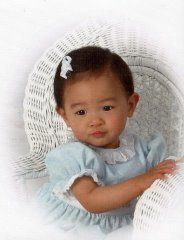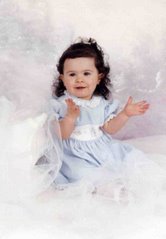What is trauma? For our adopted children,
*trauma is being separated from their birthmother. (yes, they realize at this young age that they are being separated from the person who carried them for 9 months, the familiar voice, smells, and movements.)
*trauma is not having your needs met when you cry. (huge!)
*trauma is living in an institution.
*trauma is being tied to your crib*trauma can for some, involve physical and/or se*x*ual abuse.
*trauma is being neglected
*trauma is being handed to strangers that have been waiting so long to meet you. the environment they have been in for a year or two or more, is all they know. It was not a good place, but they are too little to realize this. they are taken from all that is familiar to them.
Trauma is any stressful event which is prolonged, overwhelming, or unpredictable. Though we are familiar with events impacting children such as abuse, neglect, and domestic violence, until recently, the full impact of trauma on adopted children has not been understood.
An important aspect of trauma is in recognizing that simply because a child has been removed from a traumatic environment, this does not merely remove the trauma from the childs memory. In fact, stress is recognized to be the one primary key to unlocking traumatic memories. Unfortunately for both the adopted child and family, the experience of most traumas in the childs life is that the traumatic experiences typically occur in the context of human relationships. From that point forward, stress in the midst of a relationship will create a traumatic re-experiencing for the child, leading the child to feel threatened, fearful, and overwhelmed in an environment which otherwise may not be threatening to other people.
Keys to Healing Trauma in the Adopted Child:
1. Trauma creates fear and stress sensitivity in children. Even for a child adopted from birth, their internal systems may already be more sensitive and fearful than that of a child remaining with his biological parents. You must also consider the first nine months in which the child developed. These early experiences as well could have major implications.
2. Recognize and be more aware of fear being demonstrated by your child. Be more sensitive and tuned in to the small signals given such as clinging, whining, not discriminating amongst strangers, etc. All are signs of insecurity which can be met by bringing the child in closer, holding, carrying, and communicating to the child that he is feeling scared, but you will keep him safe.
3. Recognize the impact of trauma in your own life. One of the single greatest understandings parents can have is a self-understanding. Research tells us that far more communication occurs non-verbally than verbally. Understanding the impact of past trauma in your own life will help you become more sensitive to when your reactions are coming from a place other than your existing parent/child experience. Re-experiencing past trauma is common when parents are placed in an ongoing stressful environment.
4. Reduce external sensory stimulation when possible. Decrease television, overwhelming environments, number of children playing together at one time, and large family gatherings. When necessary that these events take place, keep the child close, explain to him that he may become stressed and he can come to you when needed.
5. Do Time-In instead of Time-out. Rather than sending the stressed out and scared child to the corner to think about his behavior, bring him into to you and help him to feel safe and secure. Internally, this will then permit him the ability to think about his actions. Though time-in is not a time for lecturing, it will allow your child an opportunity to calm his stress and then think more clearly. Another effective key is to let the child decide how much time-in he needs.
6. There is never enough affection in the world. A very simple technique for time is the affection prescription 10-20-10. Give a child 10 minutes of quality time and attention first thing in the morning, 20 minutes in the afternoon, and 10 in the evening. Following this prescription of time has proven to have a great impact on the most negative behavior.
In closing, never forget that you are a great parent. During times of stress you wont always feel like it, but both you and your child were meant to be together. Your child will teach you far more about yourself than you may have ever realized without him. Give yourself time to refuel, connect, and communicate. And finally, a secure parental relationship is the single greatest gift you can give your child. When the parental relationship is secure this will permit the child a foundation to grow from.
Copyright© 2006 Dr. Bryan Post. All rights reserved











7 comments:
I hope that people that have not experienced adoption and the attachment parenting involved will read this and understand a little more why sometimes we, as adoptive parents have to react differently sometimes to certain issues. I have no doubt the love you and Kevin have for Brooke will help her overcome and heal... it is just something that can take alot of time emotionally for our children. There are little things that trigger thoughts in their little minds sometimes that can cause them to act out. It is a process of healing. God is love and Love never fails.
Hi Denna!
That is a great post and I am sure it will help many. I am not sure if it was my blog that you read this trauma list on....but if it was....I am so glad that it helped. Like Connie said...we do need to handle situations with our adopted children a bit differently....they did not have the beginning to their lives as God intended them to have....
i love this post, Denna. It is so true. And I love what mommy24 treasures wrote, too. I know my parents thought I was too protective of Luci when we saw them this summer (My brothers thought so, too, but they actually said so out loud!).
And I was beginning to feel like I should just let Luci sleep on her own in that new bed in her room all by herself. NOT gonna happen now that I read your post. I was thinking I shouldn't do that (leave her alone) and I won't.She's been in our room on the floor for years now and it would be cruel to leave her cold turkey. Thanks for making my head straight!
Great post! Thanks for visiting my blog!
As an adopted child, i didn't like to be treated different or 'special' from other children. Please don't take this the wrong way, but I would have to disagree with what you posted from an adoptee standpoint. Adopted children want to be normal, and will be normal if treated that way. Treating a person different than other children will make them different than other children. Most people who write about these things are people who have adopted children, and especially love them. However, the adoptee is usually never asked.
I have to disagree with you. Maybe you was adopted at birth and never went through what children in a orphanage went through. Was you ever tied to a crib? Did you stay in a wet and dirty diaper for hours not understanding why somebody did not change you. Did you lay awake at night crying because you was sick and never had anybody to comfort you? Did you have a bottle propped up for you to take and the nipple was so big that you almost drowned as it went down? Did you have arms to hold you and a mouth to kiss you and let you know how much they loved you? Did you have have flies swarm around your face and land on your face where the milk was pouring down your cheek? Did you lay in your bed hungry and not understanding why nobody was there to feed you? Did you lay in your bed cold because there was no electricity?
Did you get taken away from everything you ever knew and gave to some people that looked nothing like you? If you never experienced any of that then that is wonderful and maybe you don't understand the real meaning of trauma. I don't know your circumstance because I have no idea who you are and you did not sign your name.
I agree 100% that adopted children should be treated the same as others, but I also believe that we need to take into consideration what they went through in the orphanage. My girls are treated the same, but I do have to deal with things with Brooke that I never had to deal with Courtney about. All the things that Brooke does describes the things I have looked up about trauma and the adopted child. I am glad you have never had to deal with it.
Denna,
I think that is a good, thoughtful answer.
"Anonymous" is very fortunate, indeed, if he never suffered this trauma.
Thanks again for posting this information.
Still figuring out Luci,
susan
Post a Comment